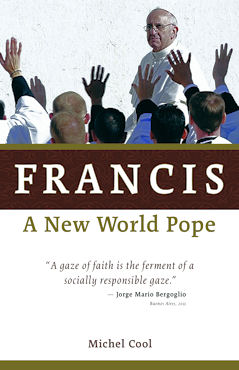
|
Posted October 5, 2013
Book: Francis: A New World Pope Author: Michel Cool Wm. E. Eerdman's, Grand Rapids, Michigan/Cambridge, UK. 2013. Pp. 120 An Excerpt from the Jacket:
Who is this new Pope -- really? In Francis, a New World Pope, Michel Cool surveys Pope Francis' journey to the papacy, his convictions, his personality, his writings, and the daunting challenges facing him -- governance of the church, interfaith relations, new evangelization in secularized societies, the worldwide economic crisis, and many more. Peppered throughout with anecdotes that demonstrate the humanity of Pope Francis --- and his sensitivity to those who are most distant from the Church --- this book paints a vibrant portrait of the man whose motto is Miserando atque eligendo: "lowly but chosen." A New Style of Papacy "The style is the man," as Georges-Louis Leclerc de Buffon, an eighteenth-century French naturalist, famously said. In this sense, Pope Francis wasted no time in overturning entrenched Vatican custom by keeping and even asserting his own, no-frills style: a simple man with an easy, spontaneous connection to people. After Joseph Ratzinger's discreet, intellectual pontificate, the one inaugurated by Jorge Mario Bergoglio struck an entirely different note, making a clear change. The two men are fundamentally different. While both come from humble backgrounds, their experiences are quite divergent. Ratzinger was shaped by his long experience as a university professor, and by a temperament that led him to seek solitude, to prefer reading and writing in a quiet study or library. Bergoglio, on the other hand, a sincere, although discreet, person, has always enjoyed reaching out to people, and is always eager to start a dialogue. One is a man of ideas and meditative thought, the other is more open to others and to action. But they both enjoy an intense spiritual life steeped in prayer and are attracted to monastic life. Who knows? Perhaps Pope Francis will enjoy going for a stroll with his predecessor in the Vatican's conventual cloister where he now lives in monk-like reclusion. In any case, Benedict's resignation will make it easier for his successor to adjust the office to appear less monarchic, and more human and accessible. One could say that by choosing to abandon his Petrine ministry, Benedict actually freed his successor of a certain number of constraints and taboos that hitherto had prevented popes from being more themselves. So a radically new papacy is there for the inventing, thanks to successive initiatives of the departing and the arriving pontiffs. What's more, by taking the name Francis, the new bishop of Rome has given a kind of pledge to those --- both within the Church and outside it -- who long to see the Vatican present itself in a way that is in greater conformance with the simplicity, humility, and poverty that the gospel elevates to the role of paths to heaven on earth. Table of Contents: Preface: Mercy on the March 1. Francis and the seagull 2. Ten pressing matters: modernizing the curia; rekindling evangelization; a new style of papacy; relations with Beijing; the Lefebvrian quarrel; interfaith dialogue; redefining ecumenism; violence against Christians; liberalization of morals; the worldwide economic crisis. 3. Pope Francis in his own words 4. The Pope we have been waiting for |
|
